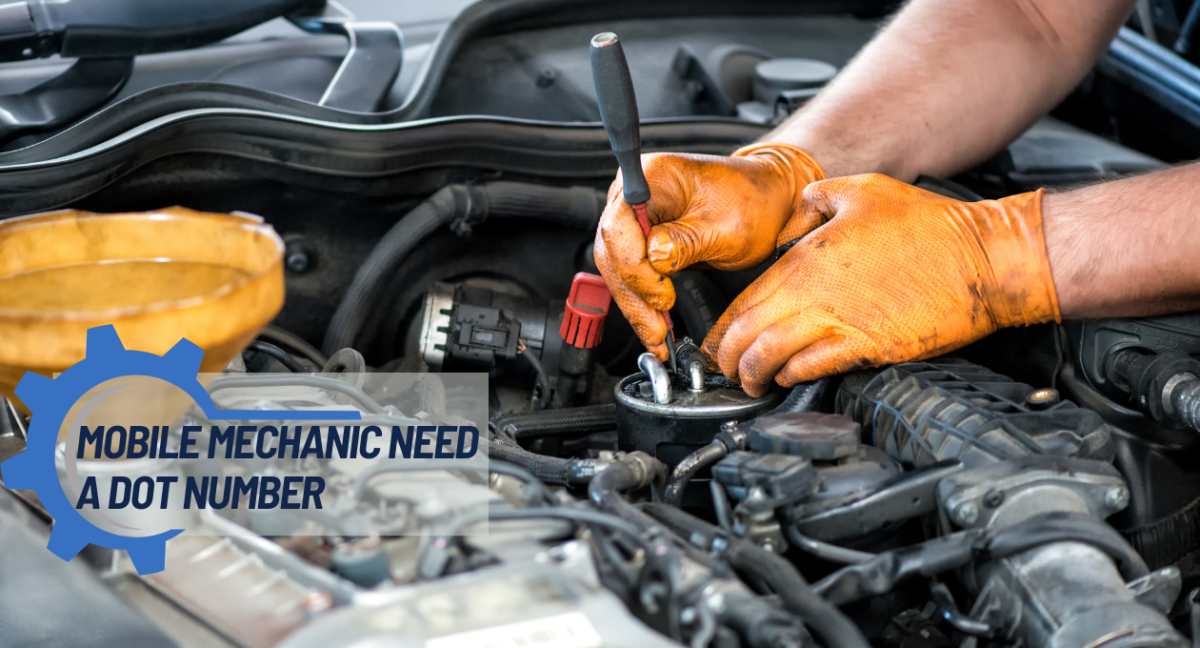Navigating Regulation: Does a Small Mobile Mechanic Need a DOT Number?

In the vast landscape of automotive services, mobile mechanics stand out as agile troubleshooters, bringing their expertise directly to customers’ doorsteps. These small-scale operations thrive on flexibility, efficiency, and personalized service. However, amidst the grease and gears of their daily grind, a question often arises: Does a small mobile mechanic need a DOT number? In this comprehensive exploration, we’ll delve into the intricacies of DOT numbers, dissect the regulations, and provide clarity for mobile mechanics navigating the regulatory maze.
Understanding DOT Numbers: A Primer
Let’s start with the basics. A DOT number, officially known as a Department of Transportation number, serves as a unique identifier issued by the Federal Motor Carrier Safety Administration (FMCSA) in the United States. The primary purpose of this number is to track and regulate commercial vehicles’ safety and compliance with federal regulations. These regulations are meticulously crafted to uphold safety standards for both drivers and the general public.
If you’re a small business owner operating in the realm of mobile mechanic services, you might have pondered whether or not you need a DOT number. This question often arises due to the nature of the work – providing mechanical services on the go, usually with a smaller operation scale compared to larger automotive repair shops. Let’s delve into the specifics to shed light on this matter.
In essence, DOT numbers serve as a checkpoint, ensuring that commercial vehicles meet specific criteria regarding weight, passenger capacity, and operational standards. But how does this relate to the realm of mobile mechanic services?
The Scope of Mobile Mechanic Services:
Mobile mechanics, often operating as small businesses or independent contractors, offer a unique value proposition: convenience. Instead of customers hauling their vehicles to a traditional repair shop, mobile mechanics bring their expertise directly to the customer’s location. This model eliminates the hassle of transportation and waiting times, providing a tailored solution for busy individuals and businesses alike.
However, the scope of mobile mechanic services varies widely. Some focus on routine maintenance tasks like oil changes and brake inspections, while others tackle more complex repairs such as engine diagnostics and electrical troubleshooting. Additionally, the size and scale of operations can vary significantly, from solo practitioners with a single service vehicle to small teams managing a fleet of mobile units.
Regulatory Considerations: Does Size Matter?
Now, let’s address the elephant in the garage: the need for a DOT number. As with many regulatory requirements, the answer isn’t a one-size-fits-all solution. Instead, it hinges on several key factors, including the nature of the services offered and the scale of operations.
At its core, the requirement for a DOT number revolves around commercial vehicle usage. According to FMCSA regulations, vehicles weighing over 10,000 pounds (4,536 kilograms) used for transporting goods or equipment, or vehicles designed to transport nine or more passengers for compensation, typically require a DOT number. This threshold is designed to ensure that operators of larger commercial vehicles adhere to stringent safety standards and regulatory oversight.
For many small mobile mechanics, this threshold might not be relevant to their operations. If the business primarily involves providing on-site repairs and maintenance services without the need for heavy commercial vehicles or passenger transportation, then the requirement for a DOT number may not apply. However, it’s essential to delve deeper into the specific regulations and seek professional guidance to ensure compliance with applicable laws.
Navigating the Regulatory Landscape:
So, how can small mobile mechanics navigate the regulatory landscape effectively? Here are some practical steps to consider:
Know Your Business Model:
Evaluate the nature of your services and the vehicles you utilize in your operations. Determine whether your vehicles meet the weight and passenger capacity thresholds outlined by FMCSA regulations.
Stay Informed:
Keep abreast of regulatory updates and changes that may impact your business. Regulatory agencies often provide resources and guidance to help businesses understand and comply with relevant regulations.
Seek Professional Guidance:
Consider consulting with legal or regulatory experts who specialize in transportation and commercial vehicle regulations. They can provide personalized guidance based on your specific circumstances and help you navigate any regulatory hurdles.
Maintain Records:
Even if a DOT number isn’t required for your operation, it’s still essential to maintain accurate records of vehicle maintenance, inspections, and any relevant documentation. This not only demonstrates a commitment to safety and professionalism but also helps streamline your business operations.
Regulatory Compliance: A Cornerstone of Professionalism
In the automotive industry, professionalism isn’t just about turning wrenches or diagnosing engine troubles—it’s also about adhering to regulatory standards that safeguard both customers and operators. For small mobile mechanics, regulatory compliance isn’t just a legal obligation; it’s a cornerstone of professionalism and trust. By demonstrating a commitment to safety and adherence to regulatory standards, mobile mechanics can instill confidence in their customers and differentiate themselves in a crowded market.
Embracing Regulatory Challenges as Opportunities:
While regulatory requirements may seem daunting at first glance, they also present opportunities for growth and improvement. Instead of viewing compliance as a burden, small mobile mechanics can leverage it as an opportunity to refine their operations, enhance safety protocols, and elevate the quality of service provided to customers. By embracing regulatory challenges with a proactive mindset, mobile mechanics can position themselves as leaders in their field, setting the standard for professionalism and excellence.
With these additional paragraphs, the article underscores the significance of regulatory compliance in the mobile mechanic industry and encourages readers to approach regulatory challenges as opportunities for growth and improvement.
To read more articles visit Hit Upon Views
Conclusion: Moving Forward with Clarity
The question of whether a small mobile mechanic needs a DOT number isn’t a straightforward yes or no. Instead, it requires careful consideration of various factors, including the nature of the services provided and the scale of operations. While regulatory requirements can seem daunting, especially for small businesses, staying informed and seeking professional guidance can help navigate the regulatory landscape effectively.
Ultimately, the goal for small mobile mechanics is to provide top-notch service to their customers while ensuring compliance with applicable laws and regulations. By understanding the nuances of DOT numbers and regulatory requirements, mobile mechanics can continue to thrive in an increasingly competitive market, bringing convenience and expertise to customers’ doorsteps with confidence and clarity.











